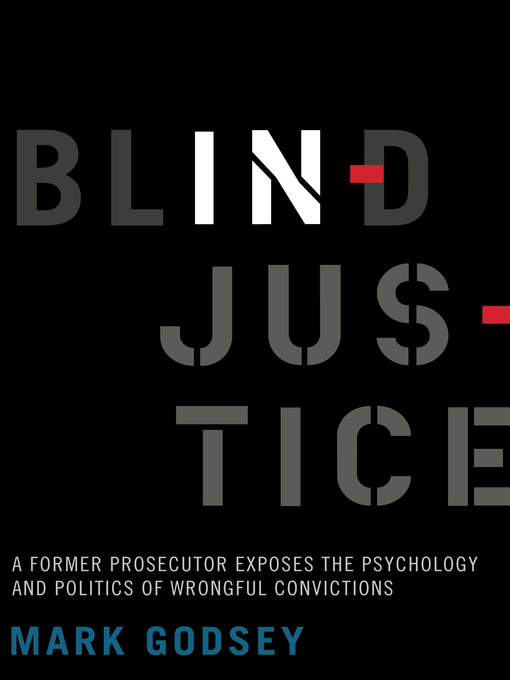Blind Injustice
A Former Prosecutor Exposes the Psychology and Politics of Wrongful Convictions
In this unprecedented view from the trenches, prosecutor turned champion for the innocent Mark Godsey takes us inside the frailties of the human mind as they unfold in real-world wrongful convictions. Drawing upon stories from his own career, Godsey shares how innate psychological flaws in judges, police, lawyers, and juries coupled with a "tough on crime" environment can cause investigations to go awry, leading to the convictions of innocent people.
In Blind Injustice, Godsey explores distinct psychological human weaknesses inherent in the criminal justice system—confirmation bias, memory malleability, cognitive dissonance, bureaucratic denial, dehumanization, and others—and illustrates each with stories from his time as a hard-nosed prosecutor and then as an attorney for the Ohio Innocence Project.
He also lays bare the criminal justice system's internal political pressures. How does the fact that judges, sheriffs, and prosecutors are elected officials influence how they view cases? How can defense attorneys support clients when many are overworked and underpaid? And how do juries overcome bias leading them to believe that police and expert witnesses know more than they do about what evidence means?
This book sheds a harsh light on the unintentional yet routine injustices committed by those charged with upholding justice. Yet in the end, Godsey recommends structural, procedural, and attitudinal changes aimed at restoring justice to the criminal justice system.
-
Creators
-
Publisher
-
Release date
October 10, 2017 -
Formats
-
Kindle Book
-
OverDrive Read
- ISBN: 9780520962958
- File size: 1811 KB
-
EPUB ebook
- ISBN: 9780520962958
- File size: 1811 KB
-
-
Languages
- English
-
Reviews
-
Library Journal
November 1, 2017
The American justice system is currently undergoing major scrutiny and outright attack. In this book, Godsey (law, Univ. of Cincinnati), a cofounder of the Ohio Innocence Project, addresses the problem from his unique perspective as a former prosecutor who became an academic activist for the wrongfully convicted. Though this account resembles a whistle-blower's description of a broken system, the author repeatedly stresses that the problems are mainly owing to psychological, bureaucratic, and political pressures rather than to "bad" people. He competently draws from classical psychology as well as modern research on memory and criminal justice operations. Chapters are organized around negative constructs that pervade the system such as dehumanization, confirmation bias, bureaucratic denial, false memory, faulty interrogation techniques, and tunnel vision. Notorious exoneration cases from Ohio and elsewhere illustrate costly system failures. The hopeful conclusion suggests reasonable reforms, and the volume overall complements Laura Caldwell and Leslie Klinger's Anatomy of Innocence, which details similar cases. Passionate and readable, this book provides meaningful support for the Innocence movement and startling insights into the justice system while admitting the reality of systemic racism but omitting its direct discussion. VERDICT Recommended for students of law and criminal justice as well as serious enthusiasts of crime and forensics.--Antoinette Brinkman, formerly with Southwest Indiana Mental Health Ctr. Lib., Evansville
Copyright 2017 Library Journal, LLC Used with permission.
-
Loading
Why is availability limited?
×Availability can change throughout the month based on the library's budget. You can still place a hold on the title, and your hold will be automatically filled as soon as the title is available again.
The Kindle Book format for this title is not supported on:
×Read-along ebook
×The OverDrive Read format of this ebook has professional narration that plays while you read in your browser. Learn more here.

